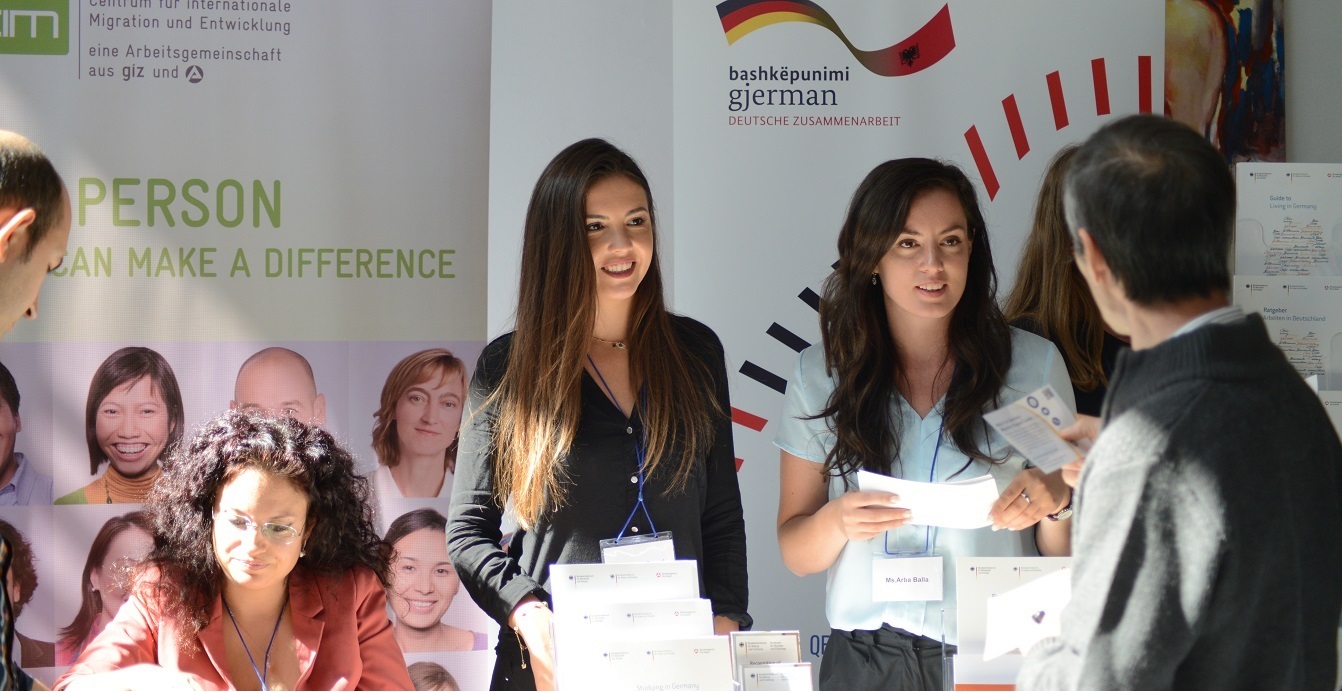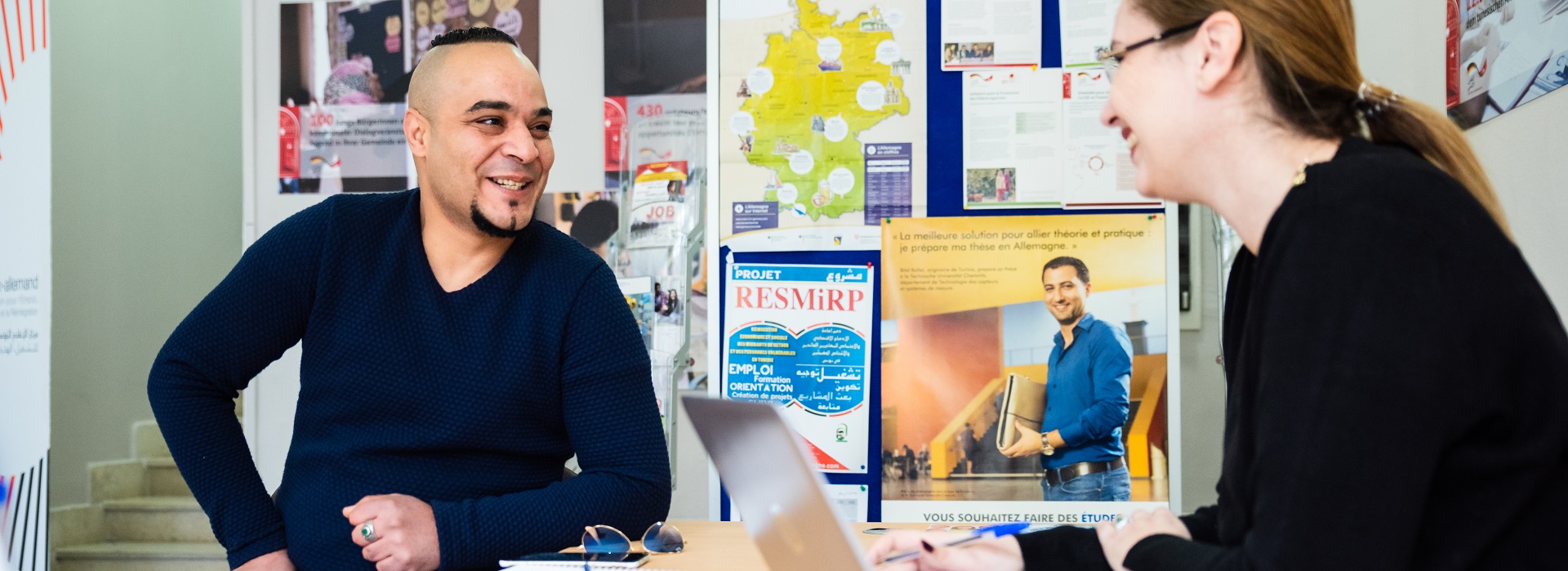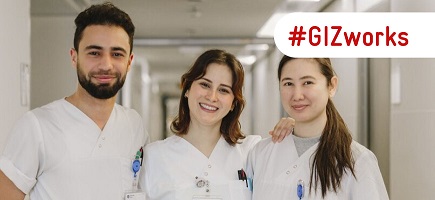

Economic development and employment: Professional prospects back home
Advice and qualifications for getting (re)established at home.
There are different ways for people to go back home and re-establish good job prospects. Advice centres for jobs, migration and reintegration provide information on local work and training opportunities. Further education and training measures help people improve their labour market prospects.
‘I wasn’t aware of the opportunities I have in my home country,’ says a delighted Wissem. The German-Tunisian advisory centre, which the Deutsche Gesellschaft für Internationale Zusammenarbeit (GIZ) GmbH operates together with the Tunisian employment agency, informed him about his professional options and placed him in a training for setting up a business. Through the newly acquired skills Wissem could fulfill his dream and open up his own little supermarket – a success he never had hoped for, during the 15 years he had spent in Europe.
Wissem knows what it feels like to have no prospects. And how tempting the yearning to have a better life can be. In 2002, he left his home country, because there is high unemployment in Tunisia. This is why he set off for Europe in the hope of finding work. After spending time in Italy, France and Germany, his application for asylum was turned down so Wissem, who is now 35, had to return to Tunisia. Today he can say: “My situation is a lot better than it ever was during my time in Europe. I finally have found my purpose. In Tunisia my head is clear, I have a well-structured life and a plan for the future.”

One-on-one advice, information on education and further training, job fairs: the advice centres provide a wide range of services.
Finding a job with the right advice
Tunisia is just one of many countries with high rates of unemployment. In particular, young people from economically underdeveloped regions see migration as the only means of escape. However, local opportunities exist – but there is a lack of information on employment and training options. Advice centres like the one in Tunis fill this void.
They provide information on education and training options, job opportunities in the region and the requirements for regular migration to Germany. The centres also help returnees from abroad to reenter the local labour market and to reintegrate into society. The staff there provide one-to-one advice and can, for instance, source tailored training measures and help those they are advising to set up their own local businesses.
At present, GIZ is operating centres in twelve partner countries - Albania, Ghana, Iraq, Kosovo, Egypt, Morocco, Nigeria, Senegal, Gambia, Pakistan, Serbia and Tunisia - on behalf of the German Federal Ministry for Economic Cooperation and Development (BMZ), in each case cooperating with the national labour administrations. The centres, which have gradually been developed since 2015, have attracted considerable interest. To date, around 190,500 advisory sessions have been held, including almost 51,100 people who have returned to their home country.
Advice with prospects: The German-Tunisian advisory centre assisted Wissem in starting up his own supermarket in his old neighborhood.

Hand in hand: better individual support measures for a new start thanks to tailored local further training
However, the advisory centres are only one element of the BMZ’s support. Together with various other projects of the German development cooperation, they work closely with actors from civil society, private companies, international organisations and institutions from local partner countries. In Tunisia for example, measures are being implemented with an aim to strengthen the consulting work of the Tunisian job agency ANETI in the long run. In a joint approach, the consulting centres and cooperation partners offer a large number of training and education opportunities for applicants to gain further qualifications in their existing line of work, thus allowing them to improve their labour market prospects. This is because certain sectors such as IT or finance are often looking for personnel but do not find any qualified applicants. In addition, founders' training assists those who are interested to become self-employed.
Thanks to support from these projects, more than 1,301,500 of these individual support measures have been provided since mid-2017. More than 242,100 people have already been placed in jobs or have started their own business, almost 35,600 of them returnees from Germany. Almost 152,300 measures were offered to help people start their own business.
Advice in Germany for returnees
Even when they are still in Germany, people who are interested in returning can obtain advice on a fresh start in their home country. To make this possible, GIZ works closely with municipalities and supports services provided by registered charities or social partners.
Reintegration scouts build bridges between returnee advice in Germany and services in the returnees' home countries in selected municipalities and at church and social agencies. The scouts support advice centres by establishing contact with one-stop shops in the respective countries. They provide information on employment prospects and services in the home countries – such as guidance on starting up a business or training and education courses. They also connect the people who want to return home with their local advice centres.
Wissem is glad that he returned to Tunisia and that he was able, with the support of the advice centre, to get settled in his home country
Last update: March 2023
